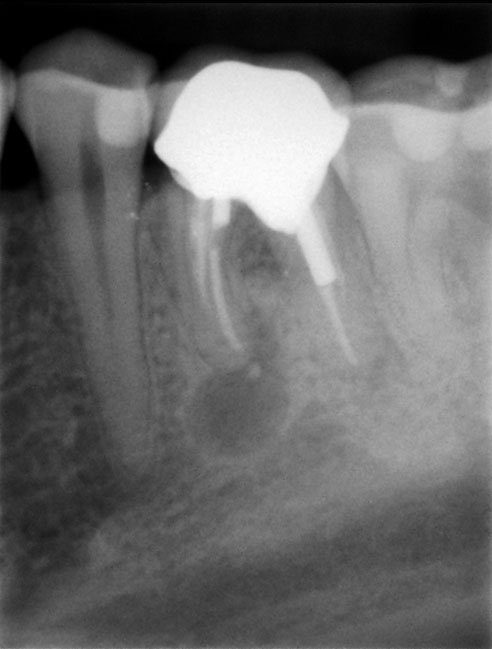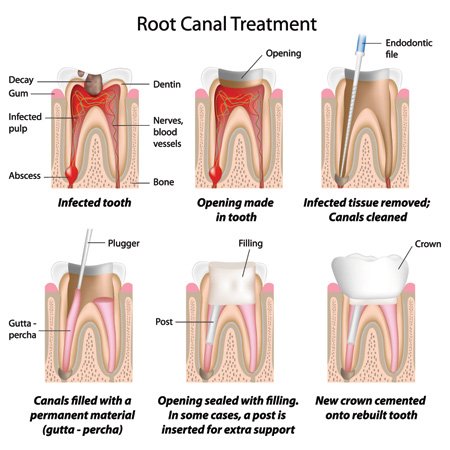Root Canal Treatment
Root Canal Treatment Applecross
This is the cleaning out of the hollow inside of the tooth and is called an endodontic treatment by dentists.
Essentially it is the removal of all of the internal tooth contents which are blood vessels lymphatics and nerve tissue (nerve).
It involves both the mechanical cleanout and chemical preparation of the canal system inside the tooth. All teeth have different shapes and roots, therefore they all have different root canal systems.
Why Do I Need a Root Canal Treatment?
The most common cause for a root canal treatment is pain. In some teeth, the nerves can become inflamed (swollen) or necrotic (dead).
In such situations, there are only two ways to stop the pain which is either to remove the whole tooth or by remove the nerve that is causing the pain.
The tooth nerve can become infected from the following:
- Trauma
- Tooth decay
- Very worn teeth
- Gum disease
- Cracks in teeth
- Broken down old fillings
- Repeated dental treatments to a tooth
It should be noted that the mere act of performing treatment on a tooth (fillings, crowns or orthodontic treatments etc) can lead to inflammation of the nerve which may require a root canal treatment.
One of the most unfortunate causes of root canal treatment is trauma. A knock to a tooth may cause the nerve to die over time. The tooth becomes grey and it can be a painless process.
X-Rays of Bone Loss Caused by Abscess


Bone loss after extraction
Are Root Canal Treatments Painful?

By far the most common question asked of dentists is this one! And we will testify that a root canal treatment is NOT painful!
The use of local anaesthetic to make the tooth numb will prevent pain while the procedure is done. In very rare circumstances, it can take a lot to get the tooth to go numb.
When this happens, we place special paste inside the tooth to allow the nerve to settle so that at a later appointment the treatment can be completed painlessly.
Some people do experience post-operative discomfort which can easily be relieved by normal over the counter pain medication.
Root canal treatments can be a fairly lengthy process to go through, and you need to be aware that you would be committing to at least two visits to finish the treatment.
Generally, it will take up to five visits to finish the root canal treatment and place a crown on the tooth for protection.
If a crown is not placed immediately, it is highly recommended to be done within the first year of a root canal treatment to prevent breakages as the tooth begins to dry out post-treatment.
What Complications Can Occur when I have an RCT?
Complications are low, but like any medical treatment, there may be unexpected complications. These complications can lead to additional costs for remedial treatments.
It may lead to the tooth being lost. Unfortunately, as we deal with biological entities we cannot give a guarantee, so it is best to avoid requiring the root canal treatment in the first instance.
These are some of the possible complications, it is not meant to include all complications but give a brief overview:
- The most common problem that can happen when performing a root canal treatment is breakage of the instruments used to clean out the tooth. These instruments are called dental files. If a file breaks in a canal that is infected, and the file can neither be removed nor bypassed, there is an increased possibility the tooth could have an abscess that does not resolve and may require extraction.
- Undiscovered canals can lead to infection and failure of the root canal treatment.
- Cracks in the tooth will lead to bacteria being able to enter into the canal system causing an infection. These cracks may not be visible and only the persistence of infection may be what leads to the diagnosis. Some patients may crack the tooth part the way through the treatment.
- Perforation of the tooth roots where the canals are very curved or very receded may happen. This is where the file used to clean the canal does not negotiate the bend in the canal and can make a hole in the side of the tooth. It is sometimes possible to fix these but in some cases, it may only be possible to extract the tooth.
- Poorly fitting restorations (fillings, crowns) can allow bacteria to reenter the root canals causing an infection. It is therefore very important that the final restoration be a high-quality one.
In other cases, the tooth may have ongoing tenderness that is inexplicable. The tooth may need to be retreated at additional cost, or extracted.
Root Canal Treatment in Applecross
If you experience extreme tooth pain, visit your Applecross dentist as soon as possible. We can restore and save your teeth with root canal treatment before it gets out of hand.
To find out more about our root canal treatment in Applecross, please contact us today at (08) 9316 0555.
We are located at 729 Canning Hwy in Applecross WA.
Frequently Asked Questions
Why is the root canal required?
When the insides of the tooth become infected, it is important to remove the pulp contained within the inner part of the tooth.
Infection and inflammation in the middle parts of the tooth can occur because of decay that spread throughout the tooth, a crack or chip, or multiple dental procedures on that tooth.
If the infection is left untreated, then it often results in pain and can lead to the formation of an abscess.
Is a root canal painful?
There is a misconception that root canal treatments are painful, but the truth is they are not. Thanks to technological advances, root canals are about as painful as getting a dental filling, which is not painful at all.
How can I avoid the need for root canal treatment in the future?
Keep your teeth decay-free by brushing and flossing daily. Maintain a healthy diet low in sugar and avoid acidic beverages such as soda.
Visit your dentist for regular professional cleanings and exams. And if you’re active in sports, consider using a custom-made mouthguard to protect your teeth from injury.
